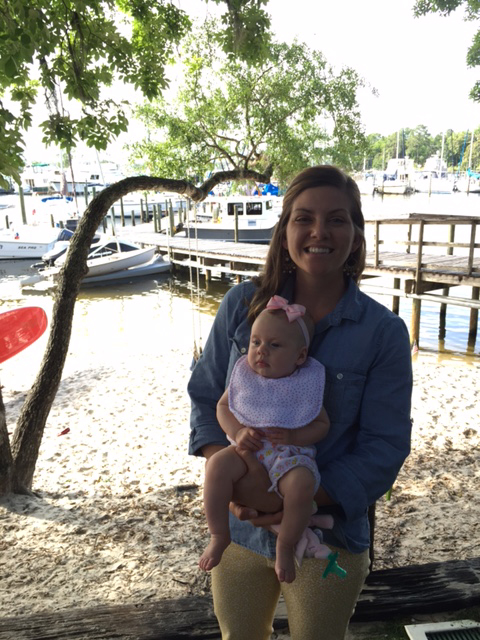Her family had no idea she was suffering.
“She was a phenomenal mother, daughter and sister. She truly was a beautiful, beautiful person. I want people to understand that despite her excellence in motherhood and devotion to her husband, she had an illness,” says her sister, Mallory Hudson, tells mom.me.
Allison Goldstein was an award-winning elementary school teacher with a 4-month-old baby girl and a supportive family. She appeared happy even to those closest to her. Her family was blindsided when one day in late June, she dropped her baby off at daycare and then took her own life.
RELATED: 7 Tips for Surviving Postpartum Depression
Goldstein, 32, was battling with postpartum depression, which only became clear to those closest to her via an email explaining why she’d chosen suicide.
"I'm so sorry that I didn't know how to describe this pain and seek help," Goldstein wrote in the email.
“She called me every day and asked for advice and to talk. It never really alerted me to anything that wasn’t a new-mom question. She was just that good at keeping it to herself,” says Hudson.
If you’ve never experienced depression, it’s hard to imagine how and why someone with a young child could take her own life. We live in a culture where becoming a mother is supposed to be one of the highlights of our lives.
Which is part of the problem.
“Isn’t it just so amazing?” people asked me in the early weeks and months following my son’s birth.
And it was! A tiny person had come out of my body! When he smiled for the first time, I felt like my heart might explode. I’d wanted—so badly—to become a mother, and suddenly, I was.
There is light at some point. The days get easier, the nights get easier, the sleep gets easier. There are resources. Let someone in.
But the sweetness of new motherhood was overshadowed by the sinking, hollow feeling inside my chest—by tight, anxious thoughts that wouldn’t allow me to sleep, even in the small windows of time when my son slept. I’d gone through periods of depression before, which I’d known put me at higher risk for postpartum depression. But I’d never experienced such lows while also caring for a newborn 24 hours a day, during what was supposed to be one of the most exciting times of my life.
Before my postpartum depression, I'd never experienced the type of dread that washed over me when I saw the morning light stretch across our wood floors as my son and I came downstairs each morning, knowing there was an entire day ahead of us to somehow fill. I’d never experienced fantasies of being hospitalized just so I could sleep. I’d certainly never been struck by intrusive, mad thoughts—like giving up this longed-for baby for adoption, or even worse, hurting him.
Goldstein's death is devastating in so many ways. Because her daughter won’t have memories of her. Because her husband, parents, sister and friends are grieving while also wondering why she never said a word about her battle. Because she was a sensitive, gifted teacher and giving woman, and the world was better for having her in it.
“She found the good in everyone, she always was positive, never complained, never bothered or burdened anyone with anything. She was just trying to keep it to herself,” says Hudson.
But mostly, it’s devastating that Goldstein didn’t get to find out what I did—that it gets better. That there’s help. That she wasn’t alone. Up to 22 percent of all women in the U.S. face a perinatal mood disorder—an umbrella term that covers maternal mental health issues ranging from depression and anxiety during pregnancy to postpartum depression, OCD and psychosis. That having postpartum depression is no more something to be ashamed of than having cancer, or diabetes, or any other physical disease.
Perinatal mood disorders are something that some of us just get, just as some of us get preeclampsia, gestational diabetes or anemia.
Even being educated about postpartum depression and using resources—like support groups, therapy and medication—didn’t shield me from the shame I felt while I had postpartum depression. I told only my husband, my parents and a few close friends what I was really going through. I felt ashamed because I wasn’t enjoying new motherhood. I felt guilty about the thoughts that throttled through my head about hurting my baby boy. It was only after I’d fully recovered that I started speaking up to more people about my experiences, because maybe it would make other people dealing with depression and other perinatal mood disorders feel less alone. Maybe it could help somebody else.
Which is exactly what Goldstein's family wants to do.

“There is light at some point. The days get easier, the nights get easier, the sleep gets easier. There are resources. Let someone in,” Hudson urges other moms who are experiencing something similar to what her sister went through.
Besides sharing their private tragedy with the media in hopes of helping other families struggling with perinatal mood disorders, Hudson, a NICU nurse, is planning to start teaching birthing classes where she’ll educate expecting parents about these issues. Hudson and her parents are also working to promote legislation to provide funding for perinatal mood disorders.
RELATED: The Words That Got Me Through Postpartum Depression
“There were over 1,000 people at her visitation," Hudson says. "Allison was truly amazing. And we want other moms to understand that they are, too. This is not who you are as a mom, as a wife, as a person—this is a disease and it needs to be acknowledged as a true illness.”
If you are experiencing postpartum depression or think someone you love is, please reach out for help. Start with Postpartum Progress or Postpartum Support International.
Know that you are not alone.
Photographs courtesy of Mallory Hudson




